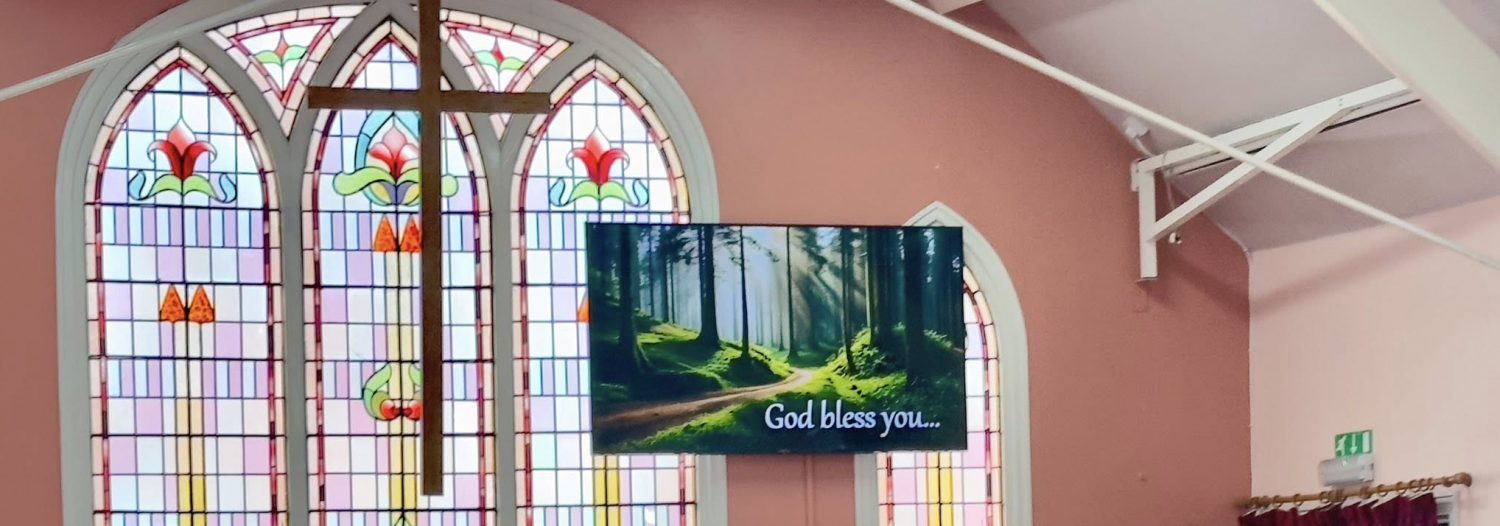TRANSFIGURATION SUNDAY
Preached on 19th February 2012
We’ve heard two readings today – one from Mark that tells of Jesus being Transfigured and secondly from Pau who speaks of the glory of Christ. There are two themes I would like to draw from these readings.
2 Corinthians states “the light of the knowledge of the Glory of God in the face of Jesus Christ.” Earlier Paul writes of the “glory of the gospel of Christ.” These quotes from Paul address the theme of light and I intend to relate it back to the Transfiguration.
The Transfiguration takes place on Mount Tabor.
Mountains are a constant theme within the Hebrew Bible and the New Testament: Abraham goes to sacrifice Isaac on top of a mountain and Moses receives the law on Mount Sinai.
But there is even more to it than this. Elijah and Moses appear next to Jesus, the prophet and the law giver. The old law of Judaism is to be replaced with a new covenant with God.
His clothes even become “dazzling white” – it is an impressive spectacle – the disciples are left in awe.
Christ is seen in a new light with God exclaiming “this is my Son, the beloved; listen to him”. As 2 Corinthians reads “let light shine out of darkness” (repeat) “let light shine out of darkness”
It is the symbolism of light that I would like us to focus on this morning
And we will do so by addressing two areas or points
Firstly is Jesus merely an old prophet who has little relevance to the chaotic world we today find ourselves in?
Secondly are there aspects within our lives where we come to see Jesus in a new light?
Firstly was Jesus merely a prophet for his place and time?
According to the gospel accounts the disciples were always seeing Jesus in a new light. The transfiguration was not unique. An example of this is not far from the story we are focussing on, for only a few verses before Jesus tells his disciples that he will go through “great suffering” and even die – imagine.
The man they believe to be the Jewish Messiah is going to suffer the death of a common criminal!
He preaches of righteousness and purity yet dines with tax collectors and prostitutes.
He insists on the importance of upholding the Jewish Law yet criticises the men that are supposed to be the upholders of this law.
The Gospel accounts constantly give a new realisation of who Jesus is. Jesus is forever appearing in a new light.
And it doesn’t stop with the gospels – throughout the centuries Jesus is seen in a new light.
Jurgen Moltmann was a firefighter at Dresden and then a POW in Scotland and Nottinghamshire during and after the Second World War. On viewing images of the Nazi’s crimes against the Jews, he began to see that God suffers with us, not one that looks down from the sky but one that is here on earth, bearing our burdens and sharing our suffering.
Moltmann came to see more clearly that as the word was made flesh God suffered as Christ on the cross
30 years later in 1974 he wrote that Jesus is one who “suffers with us… and gives (us) consolation in (our) helpless suffering”
Four decades ago this was controversial but seeing Jesus in this new light has come to be deemed one of the greatest contributions to theology of the twentieth century in identifying with a new kind of hope within the message of the cross.
Also this new light can relate to the “glory of the gospel of Christ” that Paul writes about.
What is this glory then? Is it the glory of royalty and riches?
We might think so when we consider the dazzling nature of the transfiguration.
But is this really the kind of glory which Paul talks about? Surely not
The overall evidence of Jesus from the gospel accounts is far removed from such splendour.
He wears the normal clothes of his day. He appears on a donkey not a horse. He doesn’t seek to overthrow the Roman oppressor but the hypocrisy and injustice of society. He doesn’t ask for people to bow down before him, instead he washes the feet of his disciple Peter. He preaches solidarity with the poor and building a kingdom that is not based on individualism but community that looks to our neighbour in need. Ultimately he dies the death of a criminal.
That is the real glory of Jesus
That is the new light that comes through Jesus as the Christ.
And what of this new light in our own lives? In our own world?
When we find that things fit into place, when we come to see that the way to peace and fulfilment is the way of the cross then the new light is with us.
When we choose right over wrong and truth over lies the new light is with us.
When we live for others and not ourselves the new light is with us.
So it is that we come to recognise all sorts of opportunities and possibilities in our own lives and our own world.
I began by asking two questions.
Firstly is Jesus merely an old prophet that has little relevance to the chaotic world we find ourselves in today?
Secondly are there aspects within our lives where we come to see Jesus in a new light?
Well Jesus throughout the Gospels and since is often seen in a variety of new ways, they often go against our initial thoughts of who he is and what he comes to mean.
Over the last century (as in previous centuries) he became the liberator for so many
for Martin Luther King and the civil rights movement
for Desmond Tutu and the anti apartheid movement
for many in the former Easter Bloc countries especially through the Roman Catholic Church in Poland as they overthrew the darkness of Soviet Communism
Because the world is forever changing, new light can be shed on any given situation.
Because we are evolving human beings open to change we can see things in a new light
When we encounter the glory of Christ, seeing Jesus in a new light, we overcome whatever darkness there is in our lives.
When we encounter the glory of Christ, seeing Jesus in a new light, we can find new ways to help our neighbour in distress.
On this particular Sunday we are thinking about the Transfiguration of Jesus on Mount Tabor. It’s an incident that displays who Jesus is but it also shows us what Jesus can come to mean in our present lives. This is so because we all can see him in a variety of different lights no matter what life throws at us.
David Thompson

